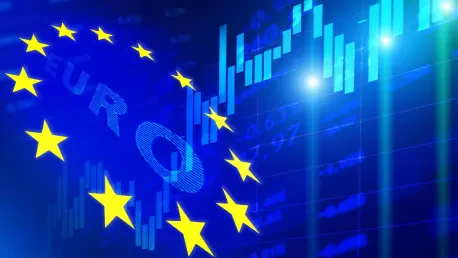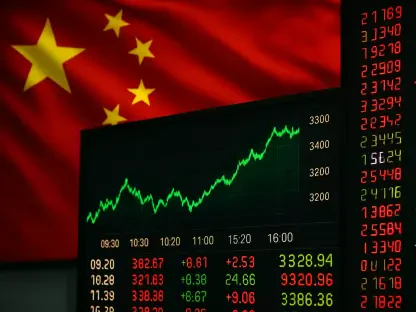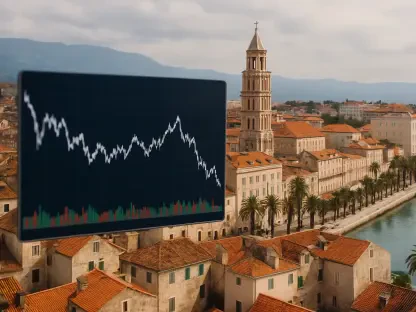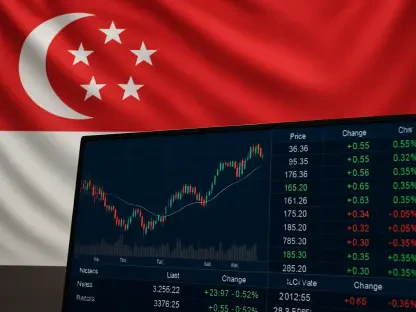As trade tensions between the U.S. and the European Union escalate, economic dynamics on both sides of the Atlantic are experiencing significant shifts. With U.S. tariffs averaging 16.5% and a range of countermeasures impacting European exports, industries heavily reliant on transatlantic trade face unprecedented challenges. However, amidst this volatile backdrop, there is a silver lining for investors seeking strategic opportunities within European markets. In sectors such as real estate, basic resources, and biotech, certain equities exhibit remarkable resilience in the face of these disruptions, providing a valuable avenue for diversification. As both American and European entities contend with evolving trade policies, identifying and capitalizing on these resilient sectors can make a critical difference between thriving and merely surviving in the current market atmosphere.
Even when overshadowed by mounting economic uncertainties stemming from tariff wars, the European equity landscape provides compelling opportunities for astute investors ready to navigate its complexities. This tumultuous environment necessitates a careful examination of sectors and companies that demonstrate an ability to withstand fluctuations and capitalize on emerging trends. Real estate investments targeting retail and logistics properties in core EU markets remain robust due to sustained internal trade activity, effectively insulating them from transatlantic disruptions. Meanwhile, in the basic resources sector, companies such as BHP, Anglo American, and TotalEnergies stand to benefit from supply chain disturbances, which drive up commodity prices globally. Through thoughtful allocation and strategic investments, the European market can serve as a counterbalance to the volatility imposed by international trade challenges.
European Market Resilience Amidst Trade Uncertainties
In the midst of ongoing trade tensions, specific sectors within European equities have demonstrated notable resilience. The real estate market, particularly areas focused on retail and logistics properties, maintains strength due to sustained intra-European trade activity. Companies like Euroshopping Centres and Segro find themselves well-positioned, given their minimal exposure to tariff-related demand fluctuations. These businesses continue to thrive by capitalizing on local market stability and existing consumer networks, allowing them to sidestep the direct impacts of trade disruptions. This strategic positioning ensures stable investment returns even as global economic conditions remain volatile, making these equities a viable option for investors seeking to diversify their portfolios.
Additionally, the basic resources sector emerges as a significant beneficiary amid ongoing tariff conflicts. Firms like BHP, Anglo American, and TotalEnergies find themselves in an advantageous position as rising commodity prices, fueled by supply chain disruptions, bolster their bottom line. As tariffs affect the global circulation of resources, these companies can leverage their extensive networks and production capabilities to meet the increased demand across different regions. Consequently, they not only weather the storm of trade uncertainties but also experience growth as market dynamics shift. By homing in on this trend, investors can effectively navigate the complexities of the current economic landscape and reap substantial rewards.
Biotech and EU Bonds: Strategic Avenues for Savvy Investors
Beyond real estate and basic resources, the biotech sector in Europe shows promising potential in this challenging environment. Companies such as ArgenX prove less affected by U.S.-EU tensions, capitalizing on innovative therapies that continue to command global market attention. With a focus on groundbreaking research and development efforts, these firms maintain competitiveness and attractiveness to a broad investor base. Biotech equities are poised for growth as healthcare demands rise, further solidifying their appeal in uncertain times. Investors who align with these trends can position themselves advantageously, tapping into burgeoning opportunities while maintaining insulation from trade-induced fluctuations.
In tandem with biotech’s potential, the EU bond market offers strategic hedging options against geopolitical changes. The European Central Bank’s gradual policy shift towards an accommodating stance stabilizes the euro, even as U.S. Treasury yields fluctuate. German 10-year Bunds, now presenting more attractive yields, stand out as solid investments amid reduced inflationary pressures within the EU. For investors mindful of insulation from U.S. rate hikes, portfolios focusing on STOXX 600 components like BASF, Unibail-Rodamco-Westfield, and BioNTech, balanced with German Bunds, optimize stability. By leveraging these diverse investments, market participants can not only safeguard their financial endeavors but also position themselves for continued growth as global economic conditions evolve.
Navigating Geopolitical Risks and Seizing Market Opportunities
As trade tensions rise between the U.S. and the European Union, both economies are experiencing notable shifts. With U.S. tariffs averaging around 16.5% and Europe imposing countermeasures, industries relying on transatlantic trade are feeling unprecedented pressure. Despite this upheaval, there are promising opportunities for investors in European markets. Sectors such as real estate, basic resources, and biotech display notable resilience amid these disturbances, offering a solid avenue for diversification. American and European businesses navigating evolving trade policies could find success by focusing on these stable sectors, which might spell the difference between thriving or merely surviving in today’s market turbulence.
The European equity market, though clouded by economic uncertainties from tariff conflicts, still offers valuable prospects for savvy investors ready to tackle its complexities. This unstable climate demands a careful look at sectors and companies capable of enduring fluctuations and seizing new trends. Real estate investments in retail and logistics within core EU areas remain strong, thanks to ongoing internal trade activity, shielding them from disruptions. In the basic resources arena, companies like BHP, Anglo American, and TotalEnergies may gain from supply chain issues that elevate global commodity prices. Strategic investments in Europe can help offset the instability caused by international trade tensions, offering a balanced approach in volatile times.









